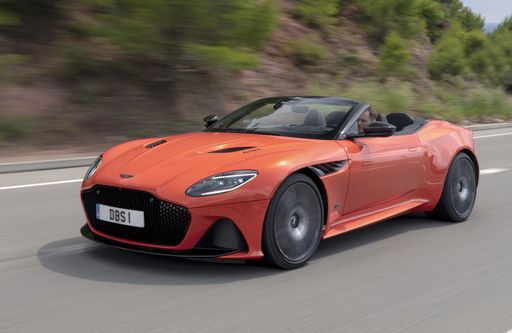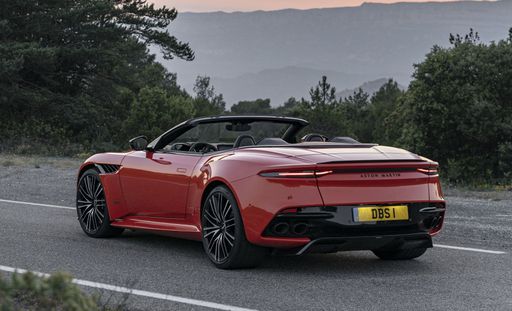Aston Martin DBS Superleggera Convertible VS Renault Trafic Bus
Aston Martin DBS Superleggera Convertible
The Aston Martin DBS Superleggera Cabrio epitomises the perfect blend of luxurious elegance and high-performance engineering. With its sleek and aerodynamic design, this convertible offers an exhilarating open-top driving experience that is both powerful and refined. The meticulously crafted interior combines premium materials with advanced technology, providing both driver and passengers with an atmosphere of sophistication and comfort.
more informationRenault Trafic Bus
The Renault Trafic Bus is a versatile and spacious option for those needing to transport multiple passengers comfortably. With its modern design and practical features, it is well-suited for both business and leisure purposes. Its efficient engine and smooth handling make it a reliable choice for long journeys.
more information @ media.astonmartin.com
@ media.astonmartin.com
 @ media.astonmartin.com
@ media.astonmartin.com
Costs and Consumption |
|
|---|---|
|
Price
about 328300
£
|
Price
about 36000 - 51900
£
|
|
Consumption L/100km
13.5
L
|
Consumption L/100km
6.8 - 7.2
L
|
|
Consumption kWh/100km
-
|
Consumption kWh/100km
-
|
|
Electric Range
-
|
Electric Range
-
|
|
Battery Capacity
-
|
Battery Capacity
-
|
|
co2
314
g/km
|
co2
178 - 190
g/km
|
|
Fuel tank capacity
75
L
|
Fuel tank capacity
80
L
|
Dimensions and Body |
|
|
Body Type
Convertible
|
Body Type
Bus
|
|
Seats
4
|
Seats
8
|
|
Doors
2
|
Doors
4
|
|
Curb weight
1945
kg
|
Curb weight
2041 - 2340
kg
|
|
Trunk capacity
260
L
|
Trunk capacity
-
|
|
Length
4715
mm
|
Length
5080 - 5480
mm
|
|
Width
1970
mm
|
Width
1956
mm
|
|
Height
1295
mm
|
Height
1973 - 1974
mm
|
|
Payload
420
kg
|
Payload
730 - 1010
kg
|
Engine and Performance |
|
|
Engine Type
Petrol
|
Engine Type
Diesel
|
|
Transmission
Automatic
|
Transmission
Manuel, Automatic
|
|
Transmission Detail
Automatic Gearbox
|
Transmission Detail
Manual Gearbox, Automat. Schaltgetriebe (Doppelkupplung)
|
|
Drive Type
Rear-Wheel Drive
|
Drive Type
Front-Wheel Drive
|
|
Power HP
770
HP
|
Power HP
110 - 170
HP
|
|
Acceleration 0-100km/h
3.6
s
|
Acceleration 0-100km/h
10.6 - 16.5
s
|
|
Max Speed
340
km/h
|
Max Speed
161 - 186
km/h
|
|
Torque
900
Nm
|
Torque
300 - 380
Nm
|
|
Number of Cylinders
12
|
Number of Cylinders
4
|
|
Power kW
566
kW
|
Power kW
81 - 125
kW
|
|
Engine capacity
5204
cm3
|
Engine capacity
1997
cm3
|
|
Top speed
340
km/h
|
Top speed
161 - 186
km/h
|
General |
|
|
Model Year
2023
|
Model Year
2023
|
|
CO2 Efficiency Class
G
|
CO2 Efficiency Class
G
|
|
Brand
Aston Martin
|
Brand
Renault
|
Aston Martin DBS Superleggera Convertible
Unveiling the Majesty: Aston Martin DBS Superleggera Volante
In the world of luxury sports cars, few names evoke the same level of reverence and excitement as Aston Martin. The DBS Superleggera Volante, a convertible that seamlessly blends performance, style, and innovation, exemplifies the pinnacle of British engineering. This overview explores the technical brilliance and cutting-edge innovations that define the DBS Superleggera Volante, an embodiment of elegance and power on four wheels.
Engineering Mastery: Powertrain and Performance
At the heart of the Aston Martin DBS Superleggera Volante lies a monstrous 5.2-litre V12 engine, delivering a breathtaking 770 PS and 900 Nm of torque. This engineering marvel allows the Volante to accelerate from 0 to 100 km/h in just 3.6 seconds, reaching a top speed of 340 km/h. Such raw power is managed by an advanced automatic transmission, ensuring a smooth yet exhilarating drive, making every journey an unforgettable experience.
Exquisite Craftsmanship and Design
The Aston Martin DBS Superleggera Volante is more than just a performance vehicle; it's a work of art. The sleek silhouette of this convertible is accentuated by its carbon-fibre body panels, which help reduce weight and increase agility. Measuring 4715 mm in length, 1970 mm in width, and 1295 mm in height, the Volante's imposing presence is matched by its aerodynamic efficiency. The luxurious interior, featuring hand-stitched leather seats and state-of-the-art infotainment, ensures that style is uncompromised by performance.
Innovation and Technology
Innovation is at the core of Aston Martin's ethos, and the DBS Superleggera Volante is no exception. The vehicle’s adaptive damping system provides a customisable driving experience, allowing the driver to select settings which best suit their driving style. Despite its formidable power output, the Volante achieves a fuel consumption rate of 13.5 L/100km and emits 314 g/km of CO2, placing it in the CO2-efficiency category G. The convertible also offers an exhilarating open-air experience at the touch of a button, with the fabric roof seamlessly retracting in seconds.
The Total Package: Features and Practicality
While the Aston Martin DBS Superleggera Volante promises pure driving pleasure, it does not skimp on practicality. The vehicle comfortably seats four passengers and offers a respectable 260 litres of boot space, accommodating both luxurious getaways and everyday travel needs. Its fuel tank capacity of 75 litres ensures fewer stops on long journeys, while the car's impeccable balance and lightweight structure guarantee a dynamic driving experience.
An Iconic Masterpiece
The Aston Martin DBS Superleggera Volante stands as a testament to the brand's commitment to craftsmanship, innovation and performance. With a price tag of €383,000, it remains an exclusive offering for those who value sophistication and engineering excellence. In every aspect, from its roaring V12 engine to its meticulously crafted interior, the Volante proves itself as a masterpiece designed for the most discerning of drivers.
Renault Trafic Bus
A Glimpse into the Renault Trafic Bus: An Icon of Versatility and Innovation
Amongst the plethora of vans designed for both business and leisure, the Renault Trafic Bus stands out as an exemplar of functionality, innovation, and style. Let's delve into what makes the Renault Trafic Bus a popular choice in the UK and across Europe, particularly focusing on its technical specifications and state-of-the-art features.
Performance Dynamics: Power Under the Hood
The Renault Trafic Bus, a staple in Renault's fleet, is driven by a robust diesel engine configuration with power outputs ranging from 110 PS to a formidable 170 PS. The diesel engines combine efficiency and power, offering torque figures between 300 to 380 Nm, ensuring smooth power delivery and capable load hauling.
Drivers can choose between manual and automatic transmissions, both designed to complement the Trafic's front-wheel-drive system. This flexibility ensures that drivers experience enhanced driving comfort whether they are navigating urban roads or cruising on the motorway.
Efficiency Meets Economy
The Trafic Bus showcases impressive fuel economy with consumption figures ranging from 6.8 to 7.2 litres per 100 kilometres. This efficiency is crucial for businesses aiming to minimise operational costs and for families seeking budget-friendly travel options.
With a generous fuel tank capacity of 80 litres, the Renault Trafic Bus is built to cover long distances with fewer fuel stops, making it an ideal choice for long haul journeys.
Technological Innovations and Comfort
The Trafic Bus isn't just about robust performance. Renault has integrated a suite of technological innovations designed to enhance driver and passenger comfort. Its cabins are equipped with the latest infotainment systems and safety technologies, providing an optimal blend of comfort and convenience.
The various trims, such as Life, Start, Spaceclass, and their respective EDC variants, cater to different needs and preferences, ensuring that customers can find the perfect configuration for their requirements.
Design and Dimensions: Space for Every Purpose
Space and versatility are at the heart of the Trafic Bus design. With its dimensions ranging from a length of 5080 to 5480 mm, and a width of 1956 mm, this vehicle offers ample room for passengers and cargo alike. The height stands between 1973 and 1974 mm, ensuring that even taller individuals can travel comfortably.
With seating for up to eight people and a payload capacity between 730 to 1010 kg, the Trafic Bus can transform seamlessly between a people-mover and a goods carrier.
Environmental Considerations
Renault has engineered the Trafic Bus with environmental responsibility in mind. The CO2 emissions range from 178 to 190 g/km, which, while modest for its class, aligns with the efficiency and performance goals set for this versatile vehicle. The CO2 efficiency class is rated as 'G', offering transparency in its environmental impact profile.
Conclusion: A Leader in Its Class
The Renault Trafic Bus continues to lead its segment through a blend of power, efficiency, and technological advancements. Whether it's for commercial transport or family adventures, the Trafic offers a reliable and adaptable solution, setting a high standard for multi-purpose vehicles.
For those seeking a distinguished blend of utility and comfort, the Renault Trafic Bus emerges as an exceptional choice, promising performance and innovation on every journey.
